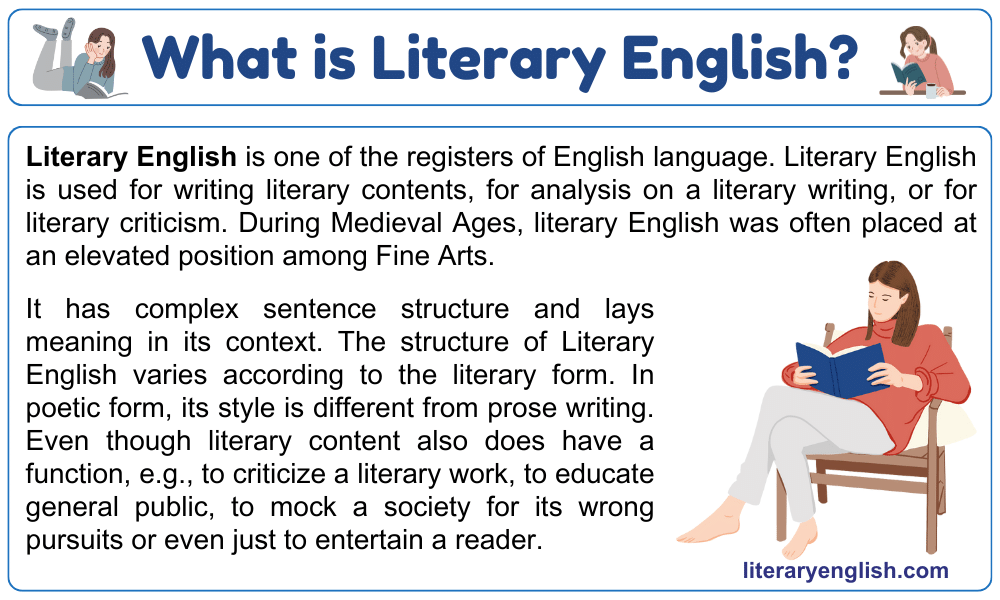What is Literary English?
Literary English is one of the registers of English language. Literary English is used for writing literary contents, for analysis on a literary writing or for literary criticism. During Medieval Ages, literary English was often placed at an elevated position among Fine Arts. During that time it was very distinctive from the colloquial English, but with the passage of time this distinction was decreased. At current era, there is no much difference between literary and colloquial English. Still there is a distinction between Literary English and conversational English.
English is one of the most broadly spoken languages across the globe. It has taken many shapes and registers. Those who want to learn English language as a second language they opt a suitable register for their appropriate domain. For example, a learner want to learn English for business around the world he will chose Business English, one who in only migrating to some native country he will learn English for general purpose and those who want to practice their abilities in literary field they will chose literary English.
Some exceptionally well-documented forms of literary English are the works of Marlowe, William Shakespeare, Sir Francis Bacon, and William Wordsworth. Shakespearean sonnets and plays are one of the classic examples of English literature and studied around the world in most of the universities. Sir Francis Bacon is also prominent classic prose write of his age. These literary works require supplementary effort to understand it. Literary language is rich with figurative language and literary devices such as metaphors, paradoxes, sarcasm, ironies, similes, and many more. On the other hand, Business English is the written and spoken English that is especially for business context and it is proper both in word choice and of the suitable tone for conducting business. In business, you may be required to speak, read, and write in a language that your co-workers, supervisors, and clients can understand quickly and effectively in a business context. Literary English may take a variety of forms such as prose, poetry and many other creative examples.
Characteristics of Literary English:
Structure of Literary English
Literary language is the form of a language used in its literary writing. It has complex sentence structure and lays meaning in its context in literature. The structure of literary English varies according to the literary form. In poetic form, its style differs from prose writing. Further, in one form, like in poetry, it varies its structure according to different sub-form of poetry. In a sonnet its style and structure differs from a heroic couplet. Literary books also have divergent forms depending on sub genre of literature.
Function of Literary English
Literary English is generally used for literary writing or for criticism or analysis on literary work. Even though literary content also do have a function, e.g., to criticize a literary work, to educate general public, to mock a society for its wrong pursuits or even just to entertain a reader. During Medieval Age, Fine Arts was at an elevated position and that era created lot of writers who took English as a tool for literary writings. They used rich language full of literary devices such as similes, metaphors, paradoxes, ironies, sarcasm, and many more. These literary devices are some time called figures of speech.
Literary English as an Ironic Language
Literary English is not clear and state forward like Business English or English for General Purpose. Business English or English for General Purpose are free from ironies as these are designed for clear and effective communication while literary English is quite rich with ironies. For understanding a literary text, a reader has to ponder upon it with full wit and efforts.
Literary English as an Ambiguous Language
People accept the view that literary English is far more ambiguous and more complicated than non-literary English (Business English or English for General Purpose). In Literary English, a reader cannot rely on surface text only but he has to ponder into the context of writing while on the other hand it is not the case in non-literary texts. For example, a market price-table has to be precise in order for people to rely on it and many people using the same market price-table should reach around the same result with common understanding. While on the other hand, if these ten people read a novel, they will come up with rather different interpretations of what a specific literary text ‘means’ or what it tries to convey.
Descriptive and Indirect
Literary English does not convey direct meaning but reader has to search for the hidden message in the text. If a literary piece of writing is handed over to various students and they are asked for the message written in that text. All the students will conclude different message from the text depending upon their way of extracting a message from the text.
High Level Grammar and Rich Vocabulary
Literary English is rich in vocabulary and carry complex sentence structure. Borrowing is too much in literary writings that make it more complex and difficult to understand for a common reader. Some genres of literature are free from grammatical rules as poetry or drama written in poetic form.
Background to English Literature
- What is English Literature?
- History of English Literature
- Various Types of Literature
- What is Literary English?
